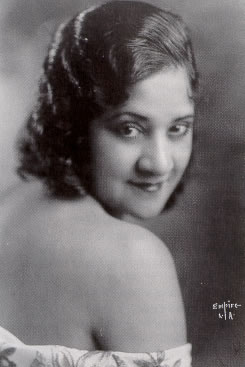Evelyn Preer (Evelyn Jarvis)

Evelyn Preer began her performance career in early vaudeville and minstrel shows. She changed her surname to Preer. Her first film role was in Oscar Micheaux’s 1919 debut film The Homesteader, when she was 23. Micheaux promoted Preer as his leading actress with a steady tour of personal appearances and a publicity campaign. Her most well-known film role is in his Within Our Gates, (1920). It is the only known surviving Micheaux film to feature her, although she appeared in more of his works. Micheaux was such an influential film director that he has been dubbed the “Father of Afro-American Cinema”. Micheaux developed many of his subsequent films to showcase Preer’s extraordinary versatility. These included The Brute (1920), The Gunsaulus Mystery (1921), Deceit (1923), Birthright (1924), The Devil’s Disciple (1925), The Conjure Woman (1926) and The Spider’s Web (1926). These Micheaux titles are presumed lost. Preer was lauded by both the black and white press for her ability to continually succeed in ever more challenging roles. She was known for refusing to play roles that she believed demeaned African Americans. In 1920, Evelyn Preer joined The Lafayette Players in Chicago. The theatrical stock company was founded in 1915 by Anita Bush, a pioneering stage and film actress known as “The Little Mother of Black Drama.” Bush and her acting troupe toured the US to bring legitimate theatre to black audiences, at a time when theatres were racially segregated by law in the South, and often by custom in the North.
By the mid-1920s, Preer began garnering much attention from the white press and she began to appear in “crossover” films and stage parts. In 1923, she acted in the Ethiopian Art Theatre’s production of The Chip Woman’s Fortune by Willis Richardson. This was the first dramatic play by an African-American playwright to be produced on Broadway. In 1926, Preer had a successful stint on Broadway in David Belasco’s production of Lulu Belle. Preer supported and understudied the actress Lenore Ulric in the leading role of Edward Sheldon’s steamy drama of a Harlem prostitute. She garnered acclaim in Sadie Thompson, in a West Coast revival of Somerset Maugham’s play about a fallen woman. She rejoined the Lafayette Players for that production in their first show in Los Angeles at the Lincoln Center. Under the leadership of Robert Levy, Preer and her colleagues performed in the first New York-style play featuring black players to be produced in California. That year she also appeared in Rain, a play adapted from Maugham’s short story by the same name. Evelyn Preer had her talkie debut in the 1930 race musical, Georgia Rose. In 1931 she performed onscreen opposite Sylvia Sidney in the film Ladies of the Big House. Her final film performance was as Lola, a prostitute, in Josef von Sternberg’s 1932 film, Blonde Venus, playing opposite Cary Grant and Marlene Dietrich. Preer was also an accomplished vocalist. She performed in cabaret and musical theater, where she was occasionally backed by such diverse musicians as Duke Ellington and Red Nichols early in their careers. Preer was regarded by many as the greatest actress of her time. Only her film by Micheaux and three shorts survive. In April 1932, Preer gave birth to her only child, daughter Edeve Thompson. Developing post-childbirth complications, Evelyn Preer died of double pneumonia on November 27, 1932 in Los Angeles, at the age of 36.
Born
- July, 16, 1896
- USA
- Vicksburg, Mississippi
Died
- November, 27, 1932
- USA
- Los Angeles, California
Cause of Death
- pneumonia
Other
- Cremated



